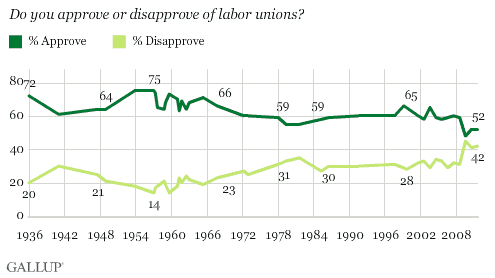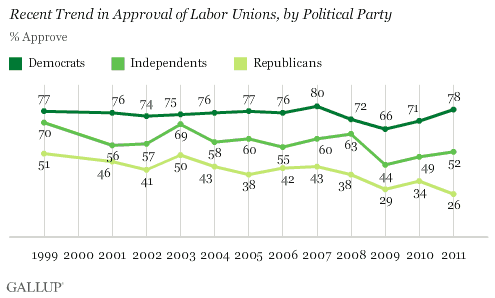PRINCETON, NJ -- In a year marked by contentious negotiations between state governments and public employee unions, a slim majority of Americans, 52%, approve of labor unions. That percentage is unchanged from last year and remains on the lower end of what Gallup has measured historically.

Gallup has asked Americans whether they approve or disapprove of labor unions periodically since 1936, and annually since 2001. More Americans have always approved than disapproved, with the lowest approval rating of 48% measured in 2009. A record-high 75% approved in two separate measurements in the 1950s.
The current results are based on Gallup's annual Work and Education poll, conducted Aug. 11-14.
Labor unions came into sharp focus earlier this year during the much-publicized standoff between Wisconsin Republicans, led by Gov. Scott Walker, and Democrats over legislation that cut state employee benefits and limited the scope of what public unions could bargain for. In recent weeks, nine members of Wisconsin's legislature faced recall elections, with two Republicans being voted out of office.
Several other states' governments have made efforts this year to cut public employee worker pay or benefits, or limit unions' collective bargaining powers.
All the discussion of union rights versus state obligations seems to have resulted in a draw in the court of public opinion, with labor unions neither gaining nor losing Americans' support overall compared with last year.
Partisan Gap in Labor Union Approval Widens
The events of this year do, however, appear to have widened an already large divide in the way partisans view labor unions. Now, 78% of Democrats and 26% of Republicans approve, a difference of 52 percentage points, compared with a 37-point gap last year. Democratic approval is now restored to the levels seen from 1999 to 2007, while Republican approval has dipped to the lowest point seen over this period.

Union Households, Members Strongly Approving of Unions
Americans who live in a household with at least one union member -- 17% of U.S. households, according to the poll -- are, not surprisingly, highly supportive of labor unions, with 73% approving. Those who live in non-union households are about equally divided between approval (48%) and disapproval (46%). These patterns are largely unchanged compared with last year.
Approval is high, but not universal, among the 10% of Americans (or 14% of employed Americans) who are themselves members of labor unions. Eighty-two percent of U.S. union members approve of labor unions this year.
The union membership figures are essentially the same as what Gallup measured in 2001, when 9% of Americans and 14% of workers claimed union membership. This suggests little change in union membership in the U.S. over the past decade.
Implications
While Americans' views of labor unions have held steady since last year, with more approving than disapproving, Americans remain less approving than in the past. Further, there is a greater divergence this year in Republican and Democratic approval of unions. This could reflect a greater politicization of union issues given the fact that many state-level efforts to curb union influence were promoted by Republican governors often backed by a Republican-controlled legislature. As a result, Democrats, as in Wisconsin, tried to defeat the proposals through parliamentary maneuvering, with Republicans responding with their own maneuvers to pass the legislation.
The recent elections in Wisconsin indicate a mixed public reaction to those efforts: most of the elected officials in that state who faced recalls survived, allowing Republicans to maintain a majority in the state Senate, though that majority is now smaller.
Survey Methods
Results for this Gallup poll are based on telephone interviews conducted Aug. 11-14, 2011, with a random sample of 1,008 adults, aged 18 and older, living in all 50 U.S. states and the District of Columbia.
For results based on the total sample of national adults, one can say with 95% confidence that the maximum margin of sampling error is ±4 percentage points.
Interviews are conducted with respondents on landline telephones and cellular phones, with interviews conducted in Spanish for respondents who are primarily Spanish-speaking. Each sample includes a minimum quota of 400 cell phone respondents and 600 landline respondents per 1,000 national adults, with additional minimum quotas among landline respondents by region. Landline telephone numbers are chosen at random among listed telephone numbers. Cell phone numbers are selected using random-digit-dial methods. Landline respondents are chosen at random within each household on the basis of which member had the most recent birthday.
Samples are weighted by gender, age, race, Hispanic ethnicity, education, region, adults in the household, and phone status (cell phone only/landline only/both, cell phone mostly, and having an unlisted landline number). Demographic weighting targets are based on the March 2010 Current Population Survey figures for the aged 18 and older non-institutionalized population living in U.S. telephone households. All reported margins of sampling error include the computed design effects for weighting and sample design.
In addition to sampling error, question wording and practical difficulties in conducting surveys can introduce error or bias into the findings of public opinion polls.
View methodology, full question results, and trend data.
For more details on Gallup's polling methodology, visit www.gallup.com.
